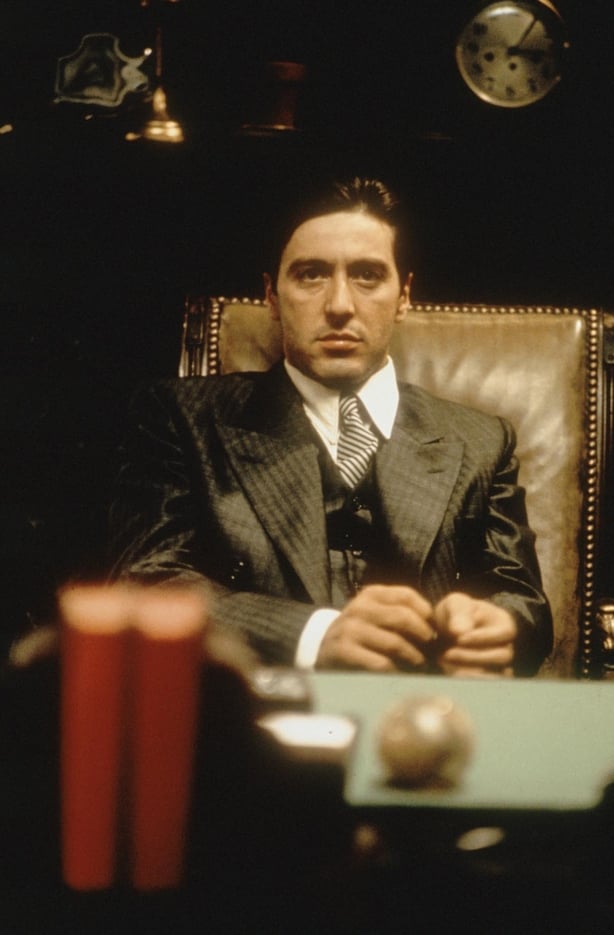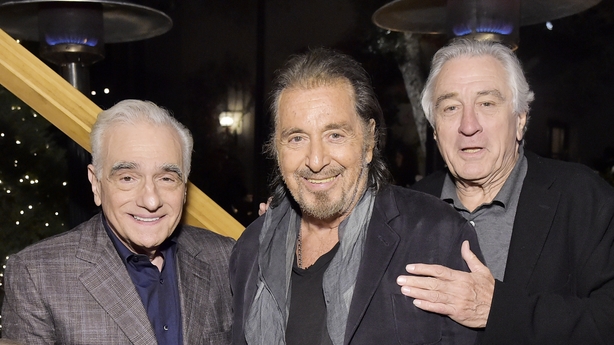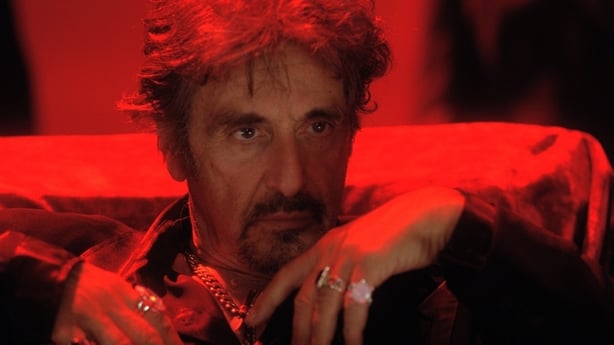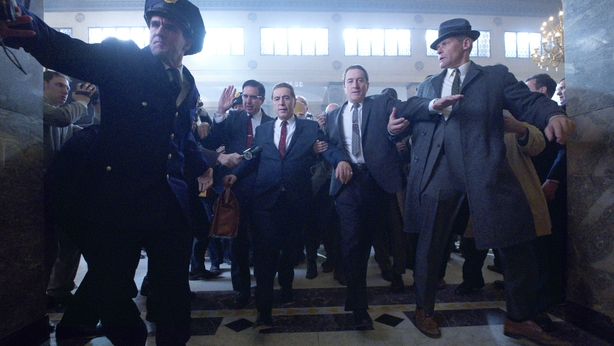Al Pacino makes a rare foray into TV with his portrayal of a Nazi hunter in Hunters. He talks to Donal O'Donoghue about his friendship with Robert De Niro, being wild about Wilde and playing Scarface.
"You seem to be looking at me as if I'm speaking another language." Al Pacino turns to his Hunters co-star, Logan Lerman. "I’m talking English this morning? You can verify that, right?" Then he laughs, an actor who loves an audience, and right now the 79-year-old has a table of journalists hanging on his every word.
The New Yorker is in London for Hunters, Amazon Prime’s stylised revenge drama about Nazis in 1977 America. He also attended the BAFTA Film Awards, nominated for The Irishman, and fulfilled a number of media engagements, including a fish-out-of-water appearance on BBC’s The One Show.
Here was a Hollywood legend whose hem everybody wanted to touch, the man who gave us Michael Corleone in The Godfather trilogy, Tony Montana in Scarface and bagged an Oscar, on his eighth nomination, for The Scent of Woman. Al Pacino doesn’t need to speak English: we’d listen anyway.
Today, he is dressed in his usual palette of black, apart from a body-length scarf beaded with white dots. His eyes are hidden behind circular sunglasses and there are two massive, matching black stone rings on his left and right hand. It’s a look, together with that volcanic hair and handsome, lived-in face that suggests artist or vagabond.
"I thought it would work," says Pacino of his wardrobe to a murmur of assenting voices, even as he apologises for the shades and takes them off briefly. He says if he leaves them off, his eyes will water and we might think he's crying. He's not.
"I love the water bottles in this hotel," he says, picking up one. "You think you’re drinking vodka. And if you’re a good enough actor you pretend that you are and you start feeling good." He laughs impishly, an actor good enough to have won all the awards that stage and screen can bestow.
You have a million questions to ask, such as 'What was it like to be Oscar-nominated for your second ever film?' 'Does he have a favourite from the many iconic characters he has played?' Or maybe 'How is it being Al Pacino?' But this is a whistle-stop on the PR conveyor belt and we're unlikely to get there. Even John Lahr’s brilliant New Yorker profile from 2014, which posed the question ‘What drives Al Pacino?’ and was conducted over a number of locations, including his home in LA, was ultimately unable to answer that question.

But in his 80th year, the great actor is as busy as ever, notching up an eye-catching cameo in Once Upon a Time…in America as well as his Oscar-nominated turn as Jimmy Hoffa in The Irishman. For Pacino, who cut his teeth on stage, it's all about the work; someone who as far back as he can remember, always wanted to be an actor.
Alfredo James Pacino grew up in the South Bronx, an only child living in a cramped apartment with his mother Rose’s parents (his father, Salvatore, bailed when ‘Sonny’ was two years old). Rose, whose own life ended tragically, introduced her boy to the world of stage and screen. Yet when I ask about that maternal influence, there is a lengthy, scary, pause. "My mom?" he finally says. "What about her?"
I repeat the story of how his performance in a school adaptation of Home, Sweet Homicide prompted a neighbour to pronounce to his mother ‘Here’s the next Brando!’ to which the 13-year-old Pacino asked: ‘Who's Brando?’ He smiles. Early in his career, Brando would give the young actor two pieces of advice: never go to court and don't move to Los Angeles. "I didn’t give you much advice did I?" he says to Logan Lerman. "But I grew up with actors and actresses and that’s my life. I don’t know anything else."

For Pacino, who started out on stage and has never forgotten or forsaken those roots, the text is always king. Or as Lee Strasberg, the famed director of the Actors Studio once said: "Some actors play characters. Al Pacino becomes them." With Hunters, his first TV series lead (his screen debut was a bit part in the 1968 cop series, NYPD and he won a Golden Globe for his portrayal of Roy Cohn in the 2003 mini-series, Angels in America), it was all about the screenplay.
"I’m very influenced by the text, always was, because I was brought up in theatre where the text became my gauge," he says. "I liked the ideas of Hunters and the way David Weil wrote the characters. I believe that the project you respond to is the project you should do, whether that is stage or film or television. In the past, I missed out on some great television offers because the advice back then – I’m talking 30 years ago – was that you don’t do television."

Acting is what he does, his obsession and maybe also his escape. In an entertainingly rambling conversation, he corrals references to the world’s great theatre companies, name-checking The National as well as the Berliner Ensemble. He lists the great US playwrights of the 20th Century, many of whom he has worked with, including David Mamet and Tony Kushner and talks about seeing his friend Bobby Cannavale in a recent production of The Hairy Ape on Broadway and how he heard things in Eugene O’Neill’s play that he just couldn’t believe.
Theatre is in his DNA and his film directorial debut, Looking for Richard (1996) was his homage to Shakespeare, a voyage around the playwright’s Richard III. Now he talks about the difference between big screen and small screen acting and how the clock "dictates the technique.
"I don’t really know which of my characters stand out. It’s really what stands out for the audience."
In conversation, Pacino very often doesn’t answer questions directly: rather he takes them for a long walk. He recalls the first time he saw Steven Berkoff’s adaptation of Salomé in London in 1989 and how he felt an immediate connection with the play and the author (at the time he didn’t know it was Oscar Wilde). Berkoff, who played the central role of King Herod, subsequently inspired Pacino’s Herod in his 2013 film, Salomé.
"Of course I did, as I always do when I like a performance, I tried to imitate Steven Berkoff’s performance," he says. "I saw Paul Muni do Scarface in a little movie theatre on Sunset and thought, ‘I just love Paul Muni, I want to be him!’ So I went in, changed it a bit. But you should see Paul Muni’s Scarface. That’s really great!" He stops. "Where was I?" Oscar Wilde. "Oh yes, I became obsessed with him."
If some have in turn become obsessed with Pacino, the actor, who never married but has three children, has always protected his private life. Does he feel that people might not tell him the truth because of his fame? "Oh yeah, sure," he says and laughs. "Of course, it’s not all people. Not my kids and not my family or those who are close to me, or else you couldn’t live. But you get used to fame and learn to understand it.

"When I worked on The Irishman, Bob De Niro and I talked about how we first met in New York and how our careers had a parallel trajectory. Even though we didn’t see each other much we had this innate bond because a similar thing had happened to us. It was like winning the lottery, like ‘Hey, you got a ticket too?’
"So the work, as well as my kids and friends, are the refuge I take from fame. Did that answer anything? It was a tough question and one I’ll be thinking about all night long."
After more than seven decades in the business, Pacino is already planning his next moves. He talks about working again with Logan Lerman and is slated to play the lead in a film version of King Lear. So what drives him? Like his early role model, Marlon Brando, he has always been chary of giving too much away about the alchemy of his art. But unlike Brando, Pacino has always nurtured his gift.
"Today’s world is a little different I think," says the actor. "There are more outlets and as Andy Warhol put it, there are more famous people. Now, I don’t want to make a generalisation but it feels to me that some move away from their passion just to be famous first. But if you want to play the violin then you have to be able to play it, otherwise, you won’t get in the Philharmonic. It’s all about the work. You have to keep doing it over and over again. You learn by doing."


